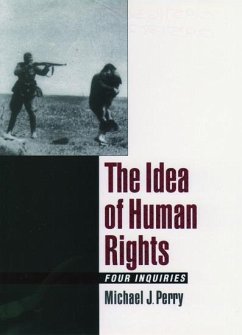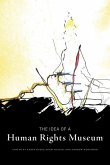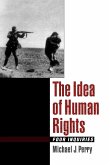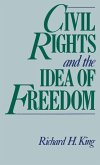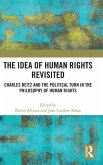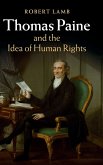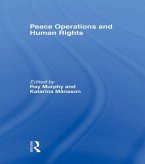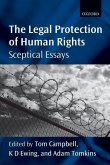Of all the influential-indeed, formative-moral ideas to occupy centre stage in the twentieth century, the notion of human rights is for many the most difficult. Inspired by a 1988 trip to El Salvador, Michael Perry's new book explores this idea in full. His typically lucid exposition of this complex issue (one so rich in social, political, and philosophical implications, especially at the international level) is rooted in the recognition that every human being is sacred, "inviolable," has "inherent dignity" and worth, and is an end to himself. Therefore, in Perry's view, the concept of human rights is inescapably religious. But are human rights universal? And are they absolute? The latest thinking from one of our nation's leading authorities on morality, politics, and religion, The Idea of Human Rights: Four Inquiries addresses these questions adroitly. The legal and moral dimensions of "rights" rhetoric itself-such as its meanings and functions-are also carefully considered.
Inspired by a 1988 trip to El Salvador, Michael J. Perry's new book is a personal and scholarly exploration of the idea of human rights. Perry is one of our nation's leading authorities on the relation of morality, including religious morality, to politics and law. He seeks, in this book, to disentangle the complex idea of human rights by way of four probing and interrelated essays. * The initial essay, which is animated by Perry's skepticism about the capacity of any secular morality to offer a coherent account of the idea of human rights, suggests that the first part of the idea of human rights--the premise that every human being is "sacred" or "inviolable"--is inescapably religious. * Responding to recent criticism of "rights talk," Perry explicates, in his second essay, the meaning and value of talk about human rights. * In his third essay, Perry asks a fundamental question about human rights: Are they universal? In addressing this question, he disaggregates and criticizes several different varieties of "moral relativism" and then considers the implications of these different relativist positions for claims about human rights. * Perry turns to another fundamental question about human rights in his final essay: Are they absolute? He concludes that even if no human rights, understood as moral rights, are absolute or unconditional, some human rights, understood as international legal rights, are--and indeed, should be--absolute. In the introduction, Perry writes: "Of all the influential--indeed, formative--moral ideas to take center stage in the twentieth century, like democracy and socialism, the idea of human rights (which, again, in one form oranother, is an old idea) is, for many, the most difficult. It is the most difficult in the sense that it is, for many, the hardest of the great moral ideas to integrate, the hardest to square, with the reigning intellectual assumptions of the age, especially what Bernard Willi
Hinweis: Dieser Artikel kann nur an eine deutsche Lieferadresse ausgeliefert werden.
Inspired by a 1988 trip to El Salvador, Michael J. Perry's new book is a personal and scholarly exploration of the idea of human rights. Perry is one of our nation's leading authorities on the relation of morality, including religious morality, to politics and law. He seeks, in this book, to disentangle the complex idea of human rights by way of four probing and interrelated essays. * The initial essay, which is animated by Perry's skepticism about the capacity of any secular morality to offer a coherent account of the idea of human rights, suggests that the first part of the idea of human rights--the premise that every human being is "sacred" or "inviolable"--is inescapably religious. * Responding to recent criticism of "rights talk," Perry explicates, in his second essay, the meaning and value of talk about human rights. * In his third essay, Perry asks a fundamental question about human rights: Are they universal? In addressing this question, he disaggregates and criticizes several different varieties of "moral relativism" and then considers the implications of these different relativist positions for claims about human rights. * Perry turns to another fundamental question about human rights in his final essay: Are they absolute? He concludes that even if no human rights, understood as moral rights, are absolute or unconditional, some human rights, understood as international legal rights, are--and indeed, should be--absolute. In the introduction, Perry writes: "Of all the influential--indeed, formative--moral ideas to take center stage in the twentieth century, like democracy and socialism, the idea of human rights (which, again, in one form oranother, is an old idea) is, for many, the most difficult. It is the most difficult in the sense that it is, for many, the hardest of the great moral ideas to integrate, the hardest to square, with the reigning intellectual assumptions of the age, especially what Bernard Willi
Hinweis: Dieser Artikel kann nur an eine deutsche Lieferadresse ausgeliefert werden.

